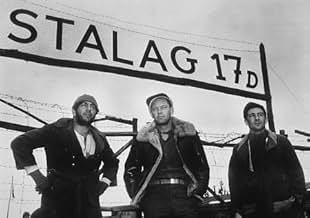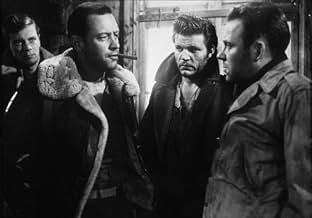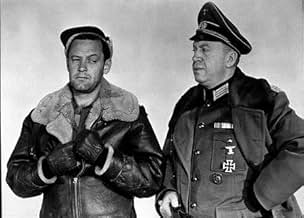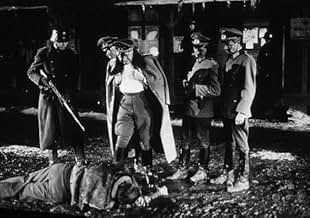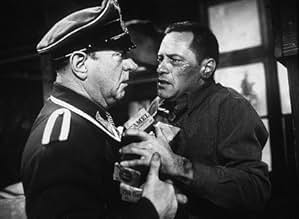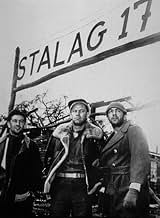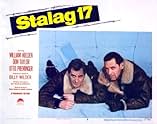IMDb रेटिंग
7.9/10
60 हज़ार
आपकी रेटिंग
कॉमेडी और कुटिलता से सजी, यह अमेरिकी सैनिकों के एक समूह की कहानी है जो कुख्यात जर्मन जेल शिविर स्टैलैग 17 में एक साथ रखे गए, यह उनमें से एक के जासूस होने के उनके संदेह और उनके भागने के प्रया... सभी पढ़ेंकॉमेडी और कुटिलता से सजी, यह अमेरिकी सैनिकों के एक समूह की कहानी है जो कुख्यात जर्मन जेल शिविर स्टैलैग 17 में एक साथ रखे गए, यह उनमें से एक के जासूस होने के उनके संदेह और उनके भागने के प्रयासों के बारे में है।कॉमेडी और कुटिलता से सजी, यह अमेरिकी सैनिकों के एक समूह की कहानी है जो कुख्यात जर्मन जेल शिविर स्टैलैग 17 में एक साथ रखे गए, यह उनमें से एक के जासूस होने के उनके संदेह और उनके भागने के प्रयासों के बारे में है।
- 1 ऑस्कर जीते
- 2 जीत और कुल 8 नामांकन
Gil Stratton
- Sgt. Clarence Harvey 'Cookie' Cook
- (as Gil Stratton Jr.)
फ़ीचर्ड समीक्षाएं
This absorbing and very entertaining movie creates a believable and interesting cast of characters, puts them into an intriguing story, and uses its settings, props, and other resources very creatively. It is a fine combination of drama and comic relief that stands up very well against anything else of its type. The setting and atmosphere are quite believable, and they make it easy to enter the characters' world.
The opening sequence sets up everything nicely, with most of POW's helping two of the prisoners in an escape attempt, while William Holden as the cynical Sefton separates himself from the rest. Sefton is interesting enough as it is, a man who simply by remaining true to his nature cannot help arousing suspicion and antagonism, and Holden was quite a good choice to play him. The story builds up nicely, with developments coming at a careful pace, and some good stretches of lighter material.
There are numerous interesting characters and good performances among the other prisoners, and in particular Robert Strauss and Harvey Lembeck steal more than one scene with their antics which, though goofy, are also an appropriate complement to the main plot and the setting. The German characters are more stylized, but both Sig Ruman and Otto Preminger make them come to life, and help them fit in seamlessly with the others.
Billy Wilder's direction and the photography also deserve praise. Besides the way that each sequence fits together so nicely with the others, there are several individual scenes and shots that are done in an impressive fashion - not flashy, but creative and thoughtful. The scene with Holden lying on his cot while most of the others sing and celebrate is one particularly good example. There is a wealth of good material throughout, making "Stalag 17" a classic that has lost nothing over the years, and one that can be seen and enjoyed several times.
The opening sequence sets up everything nicely, with most of POW's helping two of the prisoners in an escape attempt, while William Holden as the cynical Sefton separates himself from the rest. Sefton is interesting enough as it is, a man who simply by remaining true to his nature cannot help arousing suspicion and antagonism, and Holden was quite a good choice to play him. The story builds up nicely, with developments coming at a careful pace, and some good stretches of lighter material.
There are numerous interesting characters and good performances among the other prisoners, and in particular Robert Strauss and Harvey Lembeck steal more than one scene with their antics which, though goofy, are also an appropriate complement to the main plot and the setting. The German characters are more stylized, but both Sig Ruman and Otto Preminger make them come to life, and help them fit in seamlessly with the others.
Billy Wilder's direction and the photography also deserve praise. Besides the way that each sequence fits together so nicely with the others, there are several individual scenes and shots that are done in an impressive fashion - not flashy, but creative and thoughtful. The scene with Holden lying on his cot while most of the others sing and celebrate is one particularly good example. There is a wealth of good material throughout, making "Stalag 17" a classic that has lost nothing over the years, and one that can be seen and enjoyed several times.
In his lengthy and eventful career, Billy Wilder created many films that have rightly attained classic status, but his WWII prisoner of war comedy-drama Stalag 17 is arguably one of his best. The scripting is a perfect example of how to marry a tight plot with sharp dialogue and great characters, and the acting is flawless on all counts. While William Holden's performance as the cynical American sergeant rightly won him an Oscar, it is the comic antics of Robert Strauss and Harvey Lembeck that steal the show. And if there was ever a more entertaining ensemble of previously unseen (and sadly subsequently unheard of) supporting players - with the possible exception of Casablanca - I would love to see it. This film predates the more famous WWII pow film The Great Escape by more than a decade, but had Wilder, Holden and company not caused havoc in Stalag 17, the world would never have seen Steve McQueen play the cooler king with such wry aplomb. Stalag 17 is easily one of the finest films of its time, if not of all time, and I would encourage anyone who has never experienced its unique blend of cynicism, comedy, suspense and drama to check it out at the earliest available opportunity.
In defense of this great film "Stalag 17", I would like to say a few things. First of all, William Holden's performance in this film gives this film a very big lead against many other films like it. Holden is a very good actor given a very good role here as Sefton, a soldier that uniquely accepts his situation. The other supporting, and even prominent roles are good but seems "intentionally" underdeveloped for the benefit of not complicating viewers with unnecessary information. The story, consisting of a "whodunit" plot, wartime ordeals, and amusing dialogue between the characters is superb for it's time. All in all, watching "Stalag 17" is at least a fine way to spend your time.
I've read many reviews that say that they were disappointed with this film. Some were annoyed because it wasn't as realistically gritty and tense like "Saving Private Ryan". Well, that's the effect of the Hays Offices (censorship officials of American produced movies during the past). I have to say that although it may have lacked the grittiness of Spielberg's film, it still surpasses "Saving Private Ryan" for it's honest approach to it's characters such as the POW that responds to his wife's letter ("I believe it.") with a certain kind of feeling that can truly be described as honest and the German "Wake up caller" Scherbach's constant joking around with POWs while remaining true to his kommandant's wishes. The 'Animal' and Shapiro characters were obviously created for comic relief but it should only be taken as that, comic relief (Hell, everyone's a comedian and at least they tried). Most anybody that was disappointed with this film were probably disappointed for it's strange association with the TV show "Hogan's Heroes". I must say that I don't care much for that certain show but I do like this film.
I really don't think that any film should ever be compared with another film or a TV show (unless it's a spinoff, then they're just asking for it) no matter how related they are. A movie is a movie on it's own and never with the help of another, no matter the similarities. This is a classic film, worthy of it's praise yet unworthy of it's negative critique. Nobody should let personal opinions be considered flaws. Just watch it, when you have the chance, with an open mind.
I've read many reviews that say that they were disappointed with this film. Some were annoyed because it wasn't as realistically gritty and tense like "Saving Private Ryan". Well, that's the effect of the Hays Offices (censorship officials of American produced movies during the past). I have to say that although it may have lacked the grittiness of Spielberg's film, it still surpasses "Saving Private Ryan" for it's honest approach to it's characters such as the POW that responds to his wife's letter ("I believe it.") with a certain kind of feeling that can truly be described as honest and the German "Wake up caller" Scherbach's constant joking around with POWs while remaining true to his kommandant's wishes. The 'Animal' and Shapiro characters were obviously created for comic relief but it should only be taken as that, comic relief (Hell, everyone's a comedian and at least they tried). Most anybody that was disappointed with this film were probably disappointed for it's strange association with the TV show "Hogan's Heroes". I must say that I don't care much for that certain show but I do like this film.
I really don't think that any film should ever be compared with another film or a TV show (unless it's a spinoff, then they're just asking for it) no matter how related they are. A movie is a movie on it's own and never with the help of another, no matter the similarities. This is a classic film, worthy of it's praise yet unworthy of it's negative critique. Nobody should let personal opinions be considered flaws. Just watch it, when you have the chance, with an open mind.
Director Billy Wilder was certainly no stranger to the horrors of World War Two. He was born in Austria-Hungary {now Poland} in 1906, but moved to Berlin to begin a career in movies. However, following the rise of Adolf Hitler, Wilder being Jewish fled for Paris and then the United States. His mother, grandmother and stepfather died at the Auschwitz concentration camp. As such, I think it'd be safe to presume that Wilder housed a considerable hatred towards Nazis, which makes his POW-picture, 'Stalag 17 (1953),' all the more remarkable. Whereas the film might have developed into a bleak, depressing drama, the screenplay by Wilder and Edwin Blum {adapted from a play by Donald Bevan and Edmund Trzcinski} effortlessly blends drama and comedy, clearing the path for other similarly-themed war-time films {David Lean's 'The Bridge on the River Kwai (1957)' and John Sturges' 'The Great Escape (1963)'} and even TV series {'Hogan's Heroes (1965-1971)' clearly used Wilder's film as a template including an identical Sgt. Schulz despite a failed court case in which producers sued for infringement}.
The year is 1944, in the week before Christmas. Stalag 17, a Nazi prisoner-of-war camp, is situated somewhere along the Danube River, and hundreds of captured Allied sergeants have been imprisoned there. The Americans of Barrack 4 endure a dull, deprived lifestyle, with each day consisting of unwholesome meals, tedious labour and uncomfortable living conditions. Displaying that typical American cleverness and resourcefulness, many of the prisoners have banded together to ensure themselves a few added luxuries such a makeshift radio to listen to the latest war news and to build an effective escape tunnel beneath the camp. However, it soon becomes apparent that there is a Nazi spy within their midst. After two escaping prisoners are immediately shot down, and their escape passage is inexplicably discovered, the men turn their suspicions towards J.J. Sefton (William Holden), a selfish and arrogant prisoner with a dog-eat-dog mentality that sees him openly bribing the German guards for luxuries. An unsympathetic character, one who nonetheless exhibits a certain streak of integrity, Sefton decides to uncover the true traitor of Barrack 4.
Though he was reluctant to play such an unlikable character, Holden won the Best Actor Oscar for his powerful performance {via the second-shortest acceptance speech in Academy Awards history a simple "thank you"}. The other actors in the film also create distinct and likable personalities, and I particularly enjoyed the big, oafish Animal (Robert Strauss) and Shapiro (Harvey Lembeck). Goodness knows what compelled the writers to make Sgt. Schulz (Sig Ruman), a loathsome tyrant in any other film, a jolly and hearty buffoon, but it works absolutely perfectly, his character's incompetence best highlighted in the sequence where he is distracted into playing volleyball, and enjoys the game so much that he hands his loaded weapon to the nearest POW. As Sefton attempts to uncover which fellow prisoner is leaving secret messages for their Nazis captors, Wilder intersperses the drama with an episodic flow of comedic situations, placing particularly emphasis on the means by which prisoners will alleviate their desire for the opposite sex. A hilarious sequence sees the drunken Animal mistaking his dressed-up bunk-mate for the cinema beauty Betty Grable, of whom he has an undying obsession.
The year is 1944, in the week before Christmas. Stalag 17, a Nazi prisoner-of-war camp, is situated somewhere along the Danube River, and hundreds of captured Allied sergeants have been imprisoned there. The Americans of Barrack 4 endure a dull, deprived lifestyle, with each day consisting of unwholesome meals, tedious labour and uncomfortable living conditions. Displaying that typical American cleverness and resourcefulness, many of the prisoners have banded together to ensure themselves a few added luxuries such a makeshift radio to listen to the latest war news and to build an effective escape tunnel beneath the camp. However, it soon becomes apparent that there is a Nazi spy within their midst. After two escaping prisoners are immediately shot down, and their escape passage is inexplicably discovered, the men turn their suspicions towards J.J. Sefton (William Holden), a selfish and arrogant prisoner with a dog-eat-dog mentality that sees him openly bribing the German guards for luxuries. An unsympathetic character, one who nonetheless exhibits a certain streak of integrity, Sefton decides to uncover the true traitor of Barrack 4.
Though he was reluctant to play such an unlikable character, Holden won the Best Actor Oscar for his powerful performance {via the second-shortest acceptance speech in Academy Awards history a simple "thank you"}. The other actors in the film also create distinct and likable personalities, and I particularly enjoyed the big, oafish Animal (Robert Strauss) and Shapiro (Harvey Lembeck). Goodness knows what compelled the writers to make Sgt. Schulz (Sig Ruman), a loathsome tyrant in any other film, a jolly and hearty buffoon, but it works absolutely perfectly, his character's incompetence best highlighted in the sequence where he is distracted into playing volleyball, and enjoys the game so much that he hands his loaded weapon to the nearest POW. As Sefton attempts to uncover which fellow prisoner is leaving secret messages for their Nazis captors, Wilder intersperses the drama with an episodic flow of comedic situations, placing particularly emphasis on the means by which prisoners will alleviate their desire for the opposite sex. A hilarious sequence sees the drunken Animal mistaking his dressed-up bunk-mate for the cinema beauty Betty Grable, of whom he has an undying obsession.
There was surprisingly enough a lot of humor in the American attitude toward the Nazis and the Germans during World War II. Life goes on even under the conditions of being prisoners of war, and people need to laugh. In such circumstances, they especially need to laugh. We can see that in some of the songs from that time and in this play from Donald Bevant and Edmund Trzcinski that Billy Wilder made into an unusually good movie. It should be realized that the full extent of the horror that the Nazis had visited upon Europe was not known until after the war was over and we saw the films of the concentration camps.
William Holden stars as Sgt J.J. Sefton whose amoral cynicism and gift for the cheap hustle allow him to feather his nest even while a prisoner of war.
He's the guy who always had a storehouse of cigarettes, booze, silk stockings, candy, etc. under his bunk, the guy who always won at cards, whose proposition bets always gave him the edge. We had a guy like that when I was in the army. We called him "Slick."
But William Holden's Sefton is more than Slick. He is outrageously cynical and uncommonly brave. He takes chances because he doesn't have the same kind of fear that others have. Most people would feel self-conscious (and nervous) eating a fried egg while everybody else in the barracks had watery-thin potato soup. Others might feel uncomfortable with bribing German guards for bottles of Riesling or tins of sardines. Not Sefton. He flaunts his store of goodies.
Perhaps that is overdone. Perhaps the real hardships that prisoners went through are glossed over in this comedic drama--a comedy, incidentally, that plays very much like a Broadway musical without the music. Perhaps it is the case that from the distance of 1953 the deprivations of Stalag 17 have faded from memory and it is the "good times" that are recalled.
At any rate, I think it is this kind of psychology that accounts for the success of this unusual blend of quasi-realism and burlesque. Certainly Stalag 17 has been widely imitated, most familiarly in the TV sit-com "Hogan's Heroes" and to some extent on Rowan and Martin's "Laugh-In." Roberto Benigni's Life Is Beautiful, on the other hand, which also finds humor in the horrific, is of a different genre. Like Ionesco's Rhinoceros, Benigni's movie is from the theater of the absurd, not the Broadway stage.
Holden won an Oscar for his performance and Robert Strauss who played Animal was nominated in a supporting role. Otto Preminger, the legendary director and producer, was excellent as the two-faced Col Von Scherbach, the ex-calvary commander and camp commandant who can only take a phone call from the high command with his boots on so he can click his heels. I also liked Sig Rumann as Sgt Johann Sebastian Schulz ("always making with the jokes, you Americans") whose previous career as a wrestler in the US accounts for his English-language skills. Gil Stratton, who for years did the sports for CBS Channel 2 in Los Angeles, is interesting as Sefton's sidekick and funky.
Indeed, what is responsible for the success of this movie as much as anything is this fine cast playing well-defined character roles. By the way, Strauss and Harvey Lembeck ("Sugar Lips" Shapiro) were reprising their roles from Broadway.
Important is the fine plot line in which Sefton is accused of being a spy for the Nazis while the real spy is exposed step by step. At first we don't know who it is, and then we do, and then the prisoners find out.
This should be compared with Sunset Boulevard (1950). While very different movies they have similar elements which reveal part of the psyche and methods of director Billy Wilder. First there is the anti-hero as the protagonist, in both cases played by William Holden. Then there is a lot of the old Hollywood crowd appearing in both films including directors appearing as actors, Erich von Stroheim (not to mention Cecil B. DeMille in his memorable cameo as himself) in Sunset Boulevard, and Otto Preminger here. Sig Rumann has over a 100 credits going back to at least the early thirties. Finally there is the discordant mix of comedic and dramatic elements, a mix that works on our psyches because life is to some very real extent filled with tragedy in close congruence with the laughable.
But see this for William Holden who was the kind of actor who was best playing a compromised character as here and as the failed writer/reluctant gigolo in Sunset Boulevard, an actor who drank too much and tended to undistinguished, but when carefully directed could rise above his intentions and give a sterling performance.
(Note: Over 500 of my movie reviews are now available in my book "Cut to the Chaise Lounge or I Can't Believe I Swallowed the Remote!" Get it at Amazon!)
William Holden stars as Sgt J.J. Sefton whose amoral cynicism and gift for the cheap hustle allow him to feather his nest even while a prisoner of war.
He's the guy who always had a storehouse of cigarettes, booze, silk stockings, candy, etc. under his bunk, the guy who always won at cards, whose proposition bets always gave him the edge. We had a guy like that when I was in the army. We called him "Slick."
But William Holden's Sefton is more than Slick. He is outrageously cynical and uncommonly brave. He takes chances because he doesn't have the same kind of fear that others have. Most people would feel self-conscious (and nervous) eating a fried egg while everybody else in the barracks had watery-thin potato soup. Others might feel uncomfortable with bribing German guards for bottles of Riesling or tins of sardines. Not Sefton. He flaunts his store of goodies.
Perhaps that is overdone. Perhaps the real hardships that prisoners went through are glossed over in this comedic drama--a comedy, incidentally, that plays very much like a Broadway musical without the music. Perhaps it is the case that from the distance of 1953 the deprivations of Stalag 17 have faded from memory and it is the "good times" that are recalled.
At any rate, I think it is this kind of psychology that accounts for the success of this unusual blend of quasi-realism and burlesque. Certainly Stalag 17 has been widely imitated, most familiarly in the TV sit-com "Hogan's Heroes" and to some extent on Rowan and Martin's "Laugh-In." Roberto Benigni's Life Is Beautiful, on the other hand, which also finds humor in the horrific, is of a different genre. Like Ionesco's Rhinoceros, Benigni's movie is from the theater of the absurd, not the Broadway stage.
Holden won an Oscar for his performance and Robert Strauss who played Animal was nominated in a supporting role. Otto Preminger, the legendary director and producer, was excellent as the two-faced Col Von Scherbach, the ex-calvary commander and camp commandant who can only take a phone call from the high command with his boots on so he can click his heels. I also liked Sig Rumann as Sgt Johann Sebastian Schulz ("always making with the jokes, you Americans") whose previous career as a wrestler in the US accounts for his English-language skills. Gil Stratton, who for years did the sports for CBS Channel 2 in Los Angeles, is interesting as Sefton's sidekick and funky.
Indeed, what is responsible for the success of this movie as much as anything is this fine cast playing well-defined character roles. By the way, Strauss and Harvey Lembeck ("Sugar Lips" Shapiro) were reprising their roles from Broadway.
Important is the fine plot line in which Sefton is accused of being a spy for the Nazis while the real spy is exposed step by step. At first we don't know who it is, and then we do, and then the prisoners find out.
This should be compared with Sunset Boulevard (1950). While very different movies they have similar elements which reveal part of the psyche and methods of director Billy Wilder. First there is the anti-hero as the protagonist, in both cases played by William Holden. Then there is a lot of the old Hollywood crowd appearing in both films including directors appearing as actors, Erich von Stroheim (not to mention Cecil B. DeMille in his memorable cameo as himself) in Sunset Boulevard, and Otto Preminger here. Sig Rumann has over a 100 credits going back to at least the early thirties. Finally there is the discordant mix of comedic and dramatic elements, a mix that works on our psyches because life is to some very real extent filled with tragedy in close congruence with the laughable.
But see this for William Holden who was the kind of actor who was best playing a compromised character as here and as the failed writer/reluctant gigolo in Sunset Boulevard, an actor who drank too much and tended to undistinguished, but when carefully directed could rise above his intentions and give a sterling performance.
(Note: Over 500 of my movie reviews are now available in my book "Cut to the Chaise Lounge or I Can't Believe I Swallowed the Remote!" Get it at Amazon!)
क्या आपको पता है
- ट्रिवियाWilliam Holden never felt he deserved an Oscar for his performance in this film. His wife felt it was to compensate for him not winning for "Sunset Boulevard (1950)."
- गूफ़In at least two scenes, German solders are seen using US Browning 30 cal. machine guns; some still think of it as an error, but the use of captured enemy equipment was common by all sides in the war. A POW compound would be the ideal place to locate captured weapons, with a relatively limited ammo supply, whilst they still served to deter escape.
- कनेक्शनFeatured in Paramount Presents (1974)
- साउंडट्रैकWhen Johnny Comes Marching Home
(1863) (uncredited)
Written by Louis Lambert
Played during the opening credits
Played on a record and sung by the prisoners of war
Whistled a bit by Gil Stratton at the end
टॉप पसंद
रेटिंग देने के लिए साइन-इन करें और वैयक्तिकृत सुझावों के लिए वॉचलिस्ट करें
विवरण
- रिलीज़ की तारीख़
- कंट्री ऑफ़ ओरिजिन
- भाषाएं
- इस रूप में भी जाना जाता है
- Infierno en la tierra
- फ़िल्माने की जगहें
- उत्पादन कंपनी
- IMDbPro पर और कंपनी क्रेडिट देखें
बॉक्स ऑफ़िस
- बजट
- $16,61,530(अनुमानित)
- चलने की अवधि2 घंटे
- रंग
- पक्ष अनुपात
- 1.37 : 1
इस पेज में योगदान दें
किसी बदलाव का सुझाव दें या अनुपलब्ध कॉन्टेंट जोड़ें



